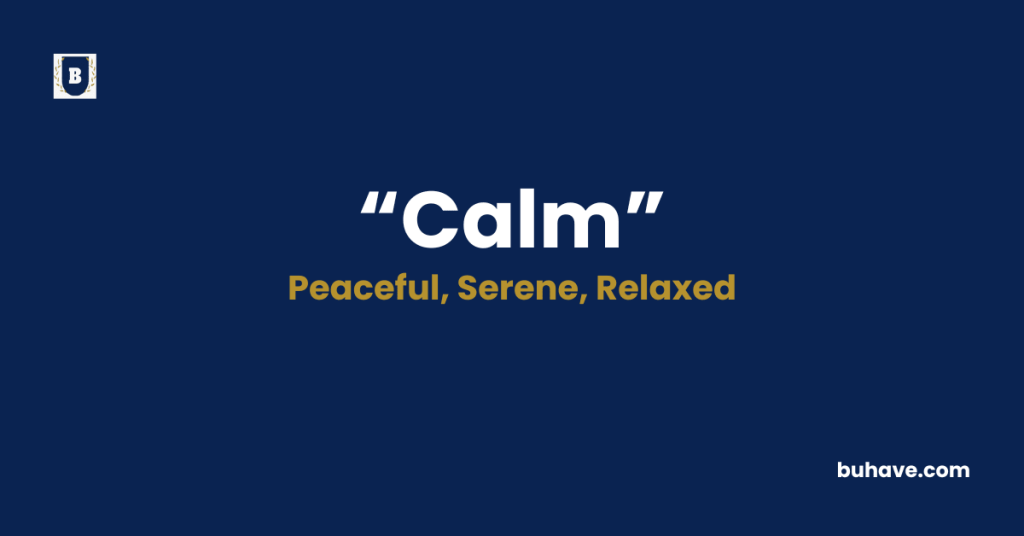The word ‘Calm’ (Adjective) describes a state of inner peace and emotional stability, where a person chooses to remain steady and composed even when faced with chaos or stress. in this guide, you’ll learn the full definition, synonyms, antonyms, etymology, and real-life examples of how to use ‘Calm’ correctly in sentences.
Calm Explained in Depth
A complete and detailed guide to the words Clam including meaning, definition, examples, etymology, synonyms, and antonyms.
Meanings of Calm
Calm means a state of being peaceful, composed, and free from stress or agitation. In other words, when someone feels calm, they maintain control over their emotions, especially during challenging or tense situations. Moreover, calm people often respond thoughtfully rather than react emotionally, which helps them handle pressure with grace. Additionally, a calm environment usually promotes clarity and focus, making it easier to think clearly and act wisely.
Therefore, staying calm plays an important role in making balanced decisions and fostering positive relationships.
Definition:
Calm refers to a state of inner peace and emotional stability, where a person chooses to remain steady and composed even when faced with chaos or stress. Rather than allowing external circumstances to control their reactions, it individuals maintain control over their thoughts and feelings. Furthermore, they create a sense of reassurance for others by handling pressure with patience and clarity. In addition, a in atmosphere encourages better communication and thoughtful decision-making.
Consequently, practicing calmness leads to greater well-being and more harmonious interactions.
Etymology:
The word “calm” traces its roots back through several languages, evolving gradually in both form and meaning. Originally, it entered English from the Old French word calme, which itself came from the Italian calma, meaning “quiet” or “fair weather.” Moreover, the Italian term derived from the Late Latin cauma, which meant “heat of the day” or “rest during the heat.” Interestingly, cauma came from the Greek word kauma (κάυμα), meaning “burning heat,” from kaiein (καίειν), meaning “to burn.” Over time,
however, the sense of the word shifted away from heat and came to signify stillness, restfulness, and emotional tranquility.
Example Sentences:
- Although the storm raged outside, she maintained a calm demeanor and reassured the children.
- First, he took a deep breath; then, he spoke in a calm voice to settle the heated argument.
- While the waves crashed earlier, the sea eventually returned to a calm state by evening.
- Rather than panic, the pilot responded with calm efficiency during the emergency.
- As the music played softly in the background, a sense of calm spread through the room.
Calm Synonyms:
Calm Antonyms:
- Agitated
- Nervous
- Anxious
- Turbulent
- Chaotic
- Excited
- Turbulent
- Frantic
- Restless
FAQs about Calm
Here are some Frequently Asked Questions (FAQs) about the word “calm”
1. What does “calm” mean?
Calm means peaceful, quiet, or not feeling anxious or upset. It can describe a person, a place, or even the weather.
2. Can “calm” describe a person?
Yes! When someone is calm, they are not stressed, angry, or overly excited.
Example: “Even when things went wrong, he stayed calm.”
3. What’s the opposite of calm?
Some opposites of calm are:
- Nervous
- Anxious
- Loud
- Chaotic
- Angry
4. How can I stay calm in stressful situations?
Here are a few tips:
- Take deep breaths
- Pause before reacting
- Think positive thoughts
- Stay focused on solutions, not problems
- Practice mindfulness or meditation
5. Can the weather be calm?
Yes! If the weather is calm, there’s no strong wind, rain, or storm.
Example: “It was a calm evening with clear skies.”
6. What are some ways to calm someone down?
- Speak gently
- Listen patiently
- Offer comfort or encouragement
- Give them space if needed
- Stay calm yourself it helps them feel safer
7. How do you use “calm” in a sentence?
- “She has a calm voice that makes people feel at ease.”
- “Please try to stay calm during the test.”
- “After the storm, the sea was calm again.”

















